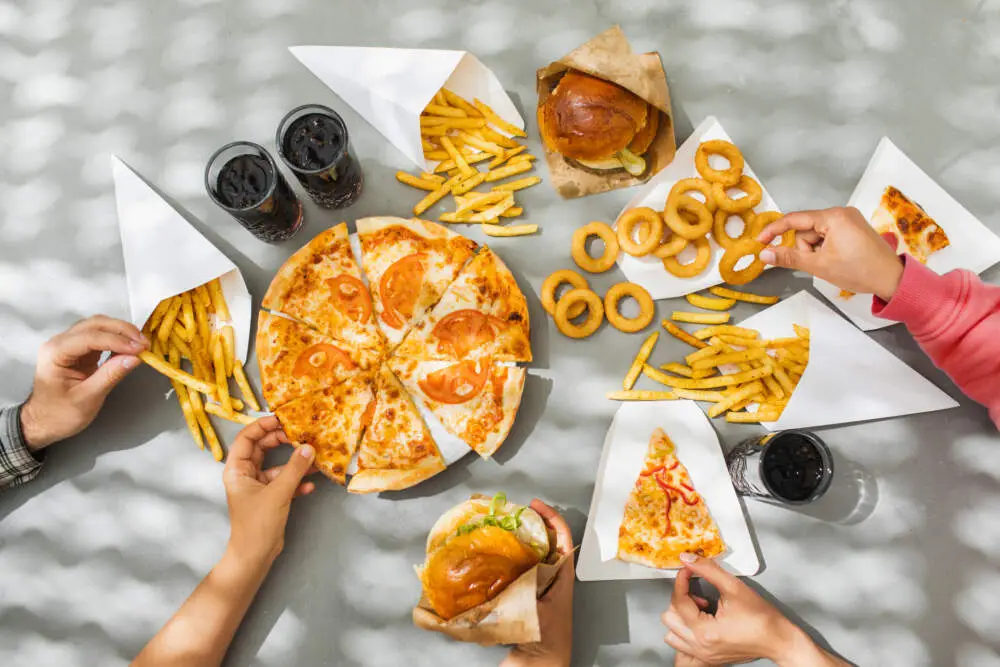Ultra-processed foods are a hot topic in nutrition and public health due to their significant impact on diet quality, obesity rates, and chronic disease risk. These foods go beyond simple processing and contain multiple ingredients, including sugar, fats, salt, artificial colors, preservatives, and flavorings that are not typically found in a home kitchen. They are often highly palatable, inexpensive, and convenient, making them a staple in many diets worldwide. Understanding which foods are considered ultra-processed can help individuals make more informed dietary choices. Here’s an overview:
Definition
Ultra-processed foods are defined by the NOVA classification, a system that categorizes foods according to the extent and purpose of their processing. This category includes food products that are made mostly or entirely from substances extracted from foods or derived from food constituents with little if any intact food.
Common Characteristics
High in additives: Preservatives, artificial colors, and flavors are common.
Low in nutrients: Often high in calories but low in vitamins, minerals, and fiber.
Highly palatable: Designed to increase cravings, leading to overconsumption.
Long shelf life: Engineered for convenience and prolonged storage.
Examples of Ultra-Processed Foods
Soft Drinks and Sweetened Beverages: These include sodas, fruit-flavored drinks, and energy drinks high in sugar and artificial ingredients.
Snack Foods: Chips, crackers, and microwave popcorn are examples of snack foods that are typically high in salt, fat, and additives.
Packaged Breads and Buns: Many commercially available breads and buns contain preservatives, sweeteners, and emulsifiers to enhance flavor, texture, and shelf life.
Breakfast Cereals: Especially those that are highly sweetened and colored with artificial ingredients.
Confectionery and Desserts: Candies, ice cream, and packaged cakes or cookies are rich in sugar, artificial flavors, and colors.
Instant Noodles and Soups: These products often contain high levels of sodium and additives like flavor enhancers and preservatives.
Reconstituted Meat Products: Sausages, hot dogs, and chicken nuggets, which are made from mechanically separated meats and often contain preservatives, fillers, and flavor enhancers.
Frozen or Ready-to-Eat Meals: These meals are convenient but can be loaded with sodium, additives, and unhealthy fats.
Fast Food: Many fast-food items are ultra-processed, high in calories, and low in nutritional value.
Health Implications
Consuming high amounts of ultra-processed foods has been linked to obesity, heart disease, type 2 diabetes, and certain types of cancer. These foods are often energy-dense and nutrient-poor, contributing to overeating and poor health outcomes.
While ultra-processed foods are convenient and often tasty, their health impacts cannot be ignored. Limiting their consumption in favor of whole or minimally processed foods can lead to better health outcomes. Making informed choices, such as reading labels carefully and opting for fresh ingredients, can help individuals navigate their diets more healthily. It’s about finding a balance that supports both health and enjoyment of food.
Strategies for Reducing Ultra-Processed Food Consumption
Reducing the intake of ultra-processed foods is an essential step towards a healthier diet and improved overall health. Here are practical strategies to help minimize consumption:
Read Labels Carefully
Understanding ingredient lists can help identify ultra-processed foods. Look for long lists of ingredients, many of which are unfamiliar or sound chemical-like. Prioritize foods with fewer and more recognizable ingredients.
Cook More at Home
Preparing meals from scratch allows for complete control over the ingredients used, enabling a shift towards whole and minimally processed foods. Cooking at home can also be a fun and rewarding activity that benefits health.
Plan Meals and Snacks
Planning helps avoid the convenience trap of ultra-processed foods. By having a plan and preparing meals and snacks in advance, individuals can choose healthier options and avoid impulse buys.
Shop the Perimeter of the Grocery Store
Fresh produce, meats, and dairy are typically located around the store’s edges. The central aisles often contain more processed foods. Focusing shopping on the perimeter can help increase the intake of whole foods.
Choose Whole Foods for Snacks
Instead of reaching for chips or cookies, opt for fruits, nuts, or yogurt. These whole food options are more nutritious and satisfying.
Be Mindful of Eating Out
When dining out or ordering in, it’s easy to consume ultra-processed foods without realizing it. Look for restaurants that use fresh, whole ingredients and avoid fast food when possible.
Educate Yourself and Your Family
Learning about the effects of ultra-processed foods on health and well-being can motivate better food choices. Educating children early on about the importance of whole foods can help them develop healthy eating habits that last a lifetime.
Moderation is Key
It’s not necessary to eliminate all ultra-processed foods from the diet completely. Instead, aim for a balanced diet where these foods take up a small portion of overall intake. Enjoying an occasional processed treat in moderation is part of a healthy, balanced approach to eating.
While ultra-processed foods are an integral part of modern diets, their impact on health cannot be overlooked. By adopting strategies to reduce their consumption, individuals can enjoy a varied and nutritious diet that supports long-term health and well-being. It’s about making informed choices, planning ahead, and prioritizing whole and minimally processed foods whenever possible. With these practices, it’s possible to enjoy the convenience of modern food products without compromising nutritional quality or health.
FAQ on Ultra-Processed Foods
What exactly makes a food “ultra-processed”?
Ultra-processed foods are characterized by their high content of additives, such as preservatives, artificial colors, flavors, and sweeteners. They are significantly modified from their original form through processes that include extrusion, molding, and pre-processing for frying. These foods often have few whole ingredients and are made largely from refined substances derived from foodstuffs.
Are all processed foods bad for health?
Not all processed foods are harmful. Processing can include basic methods like freezing, canning, baking, and drying. Some processed foods can be part of a healthy diet, including canned vegetables (with no added salt), frozen fruit, dried legumes, and pasteurized dairy products. The key is to distinguish between minimally processed foods, which can retain much of their nutritional value, and ultra-processed foods, which typically offer less nutritional quality.
Can eating ultra-processed foods in moderation be part of a healthy diet?
Yes, moderation is key. While it’s beneficial to limit the intake of ultra-processed foods, having them occasionally will not automatically lead to poor health if the overall diet is balanced and rich in nutrients. It’s the frequent and high consumption of these foods that is linked to health issues.
How can I identify ultra-processed foods in the grocery store?
Look for foods with long ingredient lists, especially those that include names of additives, preservatives, artificial colors, or flavors that you may not recognize or would not use in home cooking.
Another tip is to check if the product contains ingredients that are typically not found in a home kitchen or are not used in traditional recipes.
Is it more expensive to avoid ultra-processed foods?
While some may perceive eating fresh, whole foods as more costly, avoiding ultra-processed foods can be economical in the long run. Planning meals, buying whole foods in bulk, choosing seasonal produce, and cooking at home can help manage food expenses effectively. Additionally, investing in a healthier diet can reduce long-term healthcare costs associated with diet-related diseases.
How do ultra-processed foods affect children?
Children are particularly susceptible to the marketing of ultra-processed foods, which can influence their preferences and consumption patterns. High intake of these foods is associated with obesity, type 2 diabetes, and other metabolic disorders in children. Encouraging a diet rich in whole foods and setting an example by choosing healthier options can help promote better eating habits among children.
Can I still enjoy my favorite snacks if they are ultra-processed?
Yes, you can still enjoy your favorite snacks, even if they are ultra-processed, but try to do so in moderation. Consider pairing them with healthier options, such as fresh fruit or nuts, to balance your intake. Being mindful of portion sizes and frequency of consumption can also help you enjoy these foods without significantly impacting your overall diet quality.
Adopting a balanced approach to eating, where ultra-processed foods are consumed in moderation within a diet predominantly made up of whole and minimally processed foods, is key to maintaining good health and well-being.




